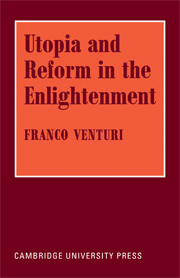Summary
It is certainly a great responsibility to be invited to give the George Macaulay Trevelyan Lectures, but it is an equally great pleasure to spend three weeks in Cambridge, with so many friends and colleagues and amid its libraries. The result of the invitation is contained in this book. Although the problem I have chosen is evidently wide-ranging, I hope the points of view from which to observe its aspects will prevent too much dispersiveness, and permit me to touch on at least some of the central questions of the great age of the Enlightenment, in its difficult yet fruitful equilibrium between Utopia and reform.
I was tempted to entitle these George Macaulay Trevelyan Lectures: ‘Was ist Aufklärung?’ However, I resisted this temptation, not through fear that I might be accused of wishing to be considered on the same level as Immanuel Kant, Moses Mendelssohn, and other scholars who, in 1784, replied to this question posed by the ‘Berliner Monatsschrift’. I hope that no one has misgivings about my own capacity for self-criticism, at least in this field. If I have not gone back to the initial data of the debate on the Enlightenment, it is because I am convinced that that debate, however interesting, has always risked leading research away from its proper path.
- Type
- Chapter
- Information
- Utopia and Reform in the Enlightenment , pp. 1 - 17Publisher: Cambridge University PressPrint publication year: 1971



